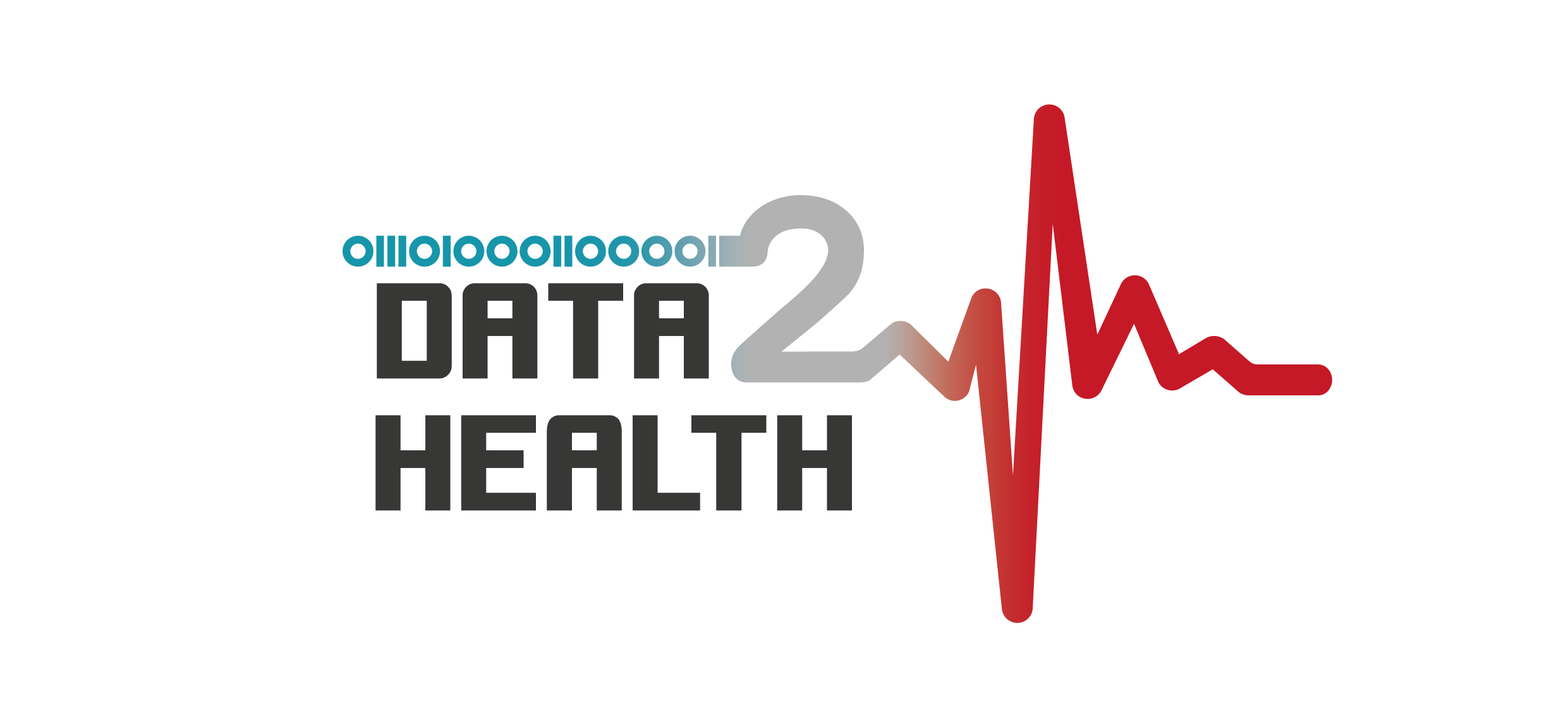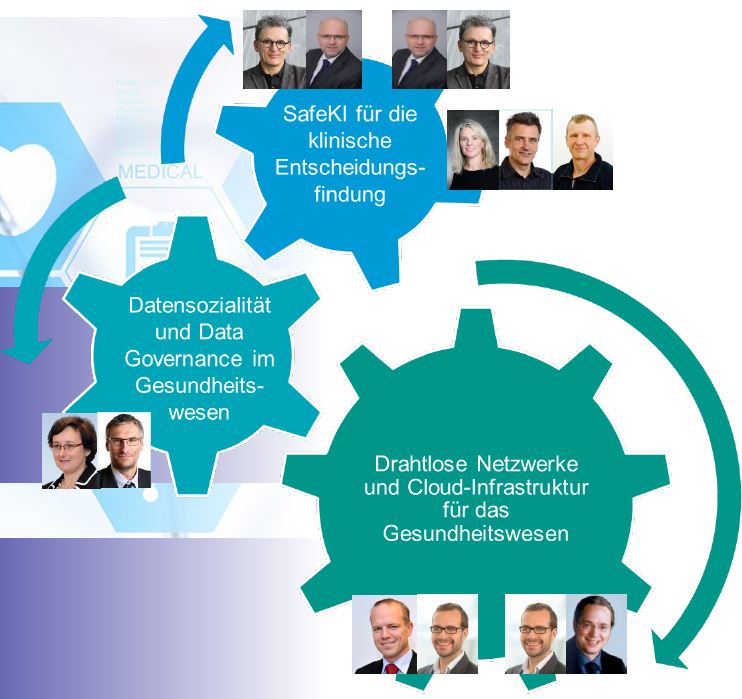Promotionsprojekte
Das Forschungskolleg Data2Health zielt auf die Erforschung datengetriebener Systeme, um bessere und frühzeitigere medizinische Entscheidungen für optimale Therapien und eine erhöhte Patientensicherheit zu ermöglichen. Die dabei notwendige Sammlung, Speicherung, Übertragung und Analyse patientenbezogener Daten erfordert vertrauenswürdige IT-Systeme. Deren Konzeption, Design und Implementierung möchten wir in diesem Kolleg durch einen ganzheitlichen Ansatz mit sechs kooperativen Promotionsarbeiten in drei Themengebieten untersuchen.
Promotionsprojekt 1: Datensozialität und Data Governance im Gesundheitswesen
Promotionsprojekt 2: Resilienz, Robustheit und Vertrauenswürdigkeit von KI-Systemen im Gesundheitswesen
In diesem Themengebiet werden die organisationale und soziale Komponente eines vertrauenswürdigen datengetriebenen Gesundheitsökosystems sowie die darin stattfindenden Aneignungsprozesse untersucht. Innovative Technologien wie KI und Big Data, intelligente Algorithmen und Daten werden dabei als Infrastrukturen mit „sozialer Wechselwirkung“ verstanden. Datensozialität und Data Governance Strukturen sollen zur Stärkung von Akzeptanz und Vertrauen sowie zur Sicherstellung von Rechtskonformität von digitalen Gesundheitsdiensten beitragen.
Ziele und Forschungsfragen:
1. Welche Charakteristika weisen Daten, die in digitalen Gesundheitslösungen erhoben, gespeichert und ausgewertet werden, auf und welche Handlungstheorien bieten Erklärmodelle für zugrundeliegende Datensozialität?
2. Welche Data Governance Strukturen sind erforderlich, um im smarten Gesundheitswesen effektiv zusammenarbeiten zu können, und dabei vertrauenswürdige KI-Basierte innovative Technologien einzusetzen, welche den hohen Ansprüchen des Datenschutzes genügen?
Doktorand:
Anchal Dua (Uni Ko)
Betreuung:
Prof. Dr. Maria A. Wimmer (Uni Ko)
Prof. Dr. Lutz Thieme (HS Ko)
KI-Verfahren und -Systeme müssen für ihren Einsatz im Gesundheitswesen sicher und resilient sein. In unterschiedlichen Bereichen ist es zu Angriffen (s.g. Adverserial Attacks) gekommen. Durch diese Angriffe kann es zu tendenziösen, nicht mit Vorgaben übereinstimmenden, oder inkorrekten Resultaten kommen. Daher soll grundlegend erforscht werden, wie KI-Systeme im Gesundheitswesen sicher gestaltet werden können.
Ziele und Forschungsfragen:
1. Wie können KI-Verfahren im medizinischen Einsatz vor Angriffen und Manipulations-versuchen geschützt werden?
2. Wie können KI-basierte medizinische Vorhersagesysteme geschützt werden?
3. Wie können Nutzer und deren Domänenwissen eingesetzt werden, um die Resilienz eines solchen Vorhersagesystem zu verbessern?
Doktorand:
Christopher Latz (Uni Ko)
Betreuung:
Prof. Dr. Andreas Mauthe (Uni Ko)
Prof. Dr. Maik Kschischo (Uni Ko)
Mentor:
Prof. Dr. Jan Jürjens (Uni Ko)
Promotionsprojekt 3: Klinische Entscheidungs-unterstützung zur Erhöhung der Patientensicherheit mit KI-Systemen
Promotionsprojekt 4: Sensorik und Lernverfahren in der Früherkennung von Dekubitus (Wundliegen)
In Krankenhäusern treten immer wieder unerwartete Komplikationen auf, die mit schweren gesundheitlichen Schäden bis hin zum Tod verbunden sind. Zwei Beispiele unter vielen sind Nierenversagen oder Sepsis. Frühe Anzeichen werden im Klinikalltag unter hohem Arbeits- und Kostendruck manchmal übersehen, was zu vermeidbaren Patientenschäden führen kann. Zur Erreichung der Ziele arbeiten wir sowohl mit öffentlich verfügbaren Daten als auch in Kooperation mit lokalen Krankenhäusern mittlerer Versorgungsstufen.
Ziele und Forschungsfragen:
1. Können Schwerstschadenereignisse aus Patientendaten im Krankenhaus mit KI-Methoden vorhergesagt werden?
2. Wie können medizinisches Vorwissen und vortrainierte Modelle integriert werden?
3. Wie kann ein solches Vorhersagesystem interpretierbar, sicher, resilient und robust gestaltet werden?
Doktorand:
Philipp Wendland (HS Ko)
Betreuung:
Prof. Dr. Maik Kschischo (Uni Ko)
Prof. Dr. Andreas Mauthe (Uni Ko)
Prof. Dr. Christof Schenkel-Häger (HS Ko)
Mentor:
Prof. Dr. Armin Fiedler (HS Ko)
Ein Dekubitus tritt bei pflegebedürftigen Personen durch diverse intrinsische und extrinsische Faktoren auf. Eine frühe Erkennung von Risiken durch die Verarbeitung von Kamera- und Sensordaten und eine KI-basierte Warnung für das Pflegepersonal kann potentiell zur Vermeidung solcher schweren Schäden beitragen.
Ziele und Forschungsfragen:
1. Kann ein Kamerasystem in Kombination mit einem neuen KI-Vorhersagemodell Aufliegeereignisse frühzeitig vorhersagen?
2. Wie können geeignete Daten für das Training des KI-Vorhersagemodells generiert werden?
3. Kann das Vorhersagesystem in einem verlässlichen Edge-Computing-Ansatz realisiert werden?
Doktorandin:
Osamah Sufyan (HS Ko)
Betreuung:
Prof. Dr. Babette Dellen (HS Ko)
Prof. Dr. Uwe Jaekel (HS Ko)
Prof. Dr.-Ing. Dietrich Paulus (Uni Ko)
Promotionsprojekt 5: Vertrauenswürdige Edge Clouds im Gesundheitsbereich
Promotionsprojekt 6: Drahtlose Vernetzung im medizinischen Kontext
Ziel dieses Projekts ist es, die Klinik von morgen zu unterstützen, die aus Sicherheits-, Effizienz- und Latenzgründen auf eine Edge-Computing-Infrastruktur angewiesen sein wird, um datengesteuerte Technologien optimal nutzen zu können.
Ziele und Forschungsfragen:
1. Um die entstehenden Daten-Hubs mittels Edge-Computing zu nutzen, werden die Daten auf lokale Sensoren und Gateways für das Internet of Things übertragen. Damit kann die Qualität der gesammelten Daten verbessert werden, indem die Analysen an dem Ort durchgeführt werden, an dem die Daten gesammelt werden.
2. Dabei unterstützen Ansätze für die sichere und vertrauenswürdige Übertragung sensibler Daten zwischen den beteiligten Unternehmen und Institutionen die benötigte verteilte Datenanalyse, wie beispielsweise der Ansatz „International Data Spaces“ (mit Instanziierung „Medical Data Space“) und Gaia-X.
Doktorandin:
Duaa Elsofi (Uni Ko)
Betreuung:
Prof. Dr. Jan Jürjens (Uni Ko)
Prof. Dr. Wolfgang Kiess (HS Ko)
Mentor:
Prof. Dr. Timo Vogt (HS Ko)
Das sechste Promotionsvorhaben befasst sich mit der drahtlosen Vernetzung in Kliniken. Daten, die aus dem Netzwerk abgeleitet werden, sollen dabei für medizinische Zwecke nutzbar gemacht werden.
Ziele und Forschungsfragen:
1. Wie werden die Datenströme wichtiger Geräte oder Sensoren (z.B. solcher aus Promotionsprojekt 4) im Multinetz gesteuert und parallel sowie koordiniert über verschiedene Drahtlostechnologien angebunden, um deren Verfügbarkeit zu erhöhen?
2. Wie lassen sich medizinisch relevante Zusatzinformationen zur Erhöhung des Vertrauens in die Daten aus der Orchestrierung der drahtlosen Technologien ableiten, etwa durch eine Zuordnung von Vitalparametern von mobilen Sensoren zu Patienten?
Doktorand:
Konrad Junkes (HS Ko)
Betreuung:
Prof. Dr. Wolfgang Kiess (HS Ko)
Prof. Dr. Hannes Frey (Uni Ko)
Mentor:
Prof. Dr. Timo Vogt (HS Ko)

